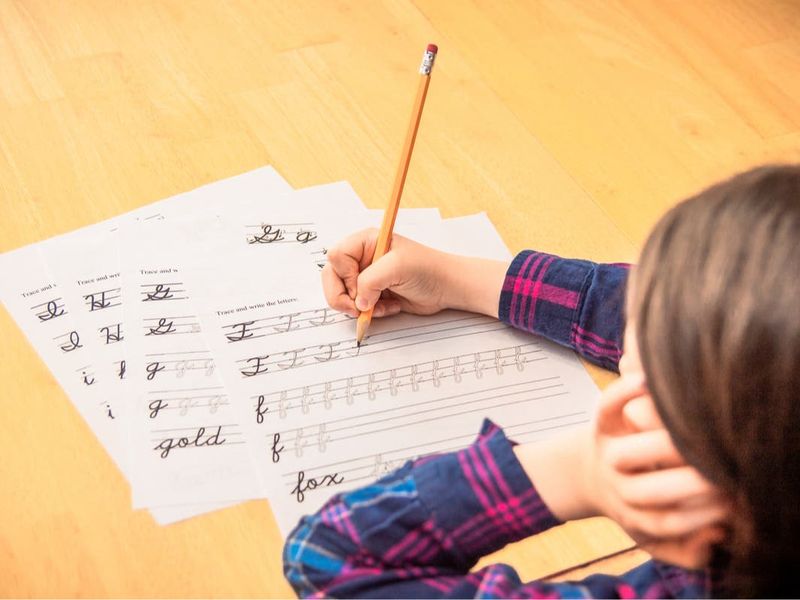As we navigate the rapidly changing landscape of the 21st century, it’s clear that certain essential skills were overlooked by Generation X when raising their children. While technology, social media, and digital literacy have become second nature to younger generations, there are fundamental skills that have been left by the wayside. These skills, once commonplace, are now seen as rare talents, yet they hold immense value in fostering independence, self-reliance, and personal growth. This list of 13 forgotten skills serves as a gentle reminder of the importance of nurturing well-rounded individuals capable of navigating both modern and traditional challenges.
1. Basic Cooking

Cooking skills are foundational for independence. Many Gen X parents, overwhelmed by busy lifestyles, didn’t emphasize this. Imagine a college student facing their first apartment kitchen, puzzled over boiling water. Cooking isn’t just about survival; it’s creativity unleashed. Experimenting with spices, textures, or flavors opens culinary worlds.
Cooking serves as a confidence booster. Success in the kitchen translates to success in life. A simple homemade meal can evoke pride unmatched by takeout. Knowing one’s way around a kitchen empowers, enabling healthier eating and self-sufficiency.
2. Financial Literacy

In today’s complex financial landscape, grasping basics like budgeting and saving is crucial. Yet, many young adults fumble through financial decisions. Picture a 20-something lost in a sea of bills, striving to balance a checkbook.
Financial literacy empowers wise decision-making, avoiding pitfalls like debt. Understanding interest rates or credit scores isn’t innate; it’s learned. Without this skill, poor choices compound quickly.
Teaching financial literacy early on lays groundwork for stability. It’s a skill that pays dividends throughout life, fostering independence and confidence in managing one’s future.
3. Sewing and Mending

Sewing, once a staple skill, is often neglected. Imagine a teen excitedly discovering they can mend a favorite pair of jeans, saving them from the landfill. This skill promotes sustainability and creativity.
By sewing, individuals gain patience and precision, transforming textiles into functional art. It’s empowering to repair instead of replace. Such skills foster environmental awareness, highlighting the value of extending a garment’s life.
Mending also connects generations, bridging gaps through shared knowledge. Learning to sew enriches life with creativity, practicality, and tradition.
4. Gardening Basics

Gardening offers more than fresh produce; it fosters a connection to nature. Envision a young adult nurturing tomatoes on a balcony, learning patience as they grow. This skill teaches responsibility and the joy of nurturing life.
Gardening combats digital fatigue, providing a tactile, calming experience. It instills appreciation for food origins, promoting healthier eating habits. With each sprout, a sense of accomplishment blooms.
As urban spaces shrink, gardening’s value rises. It empowers self-sufficiency, reducing reliance on grocery stores while enhancing mental well-being through nature’s touch.
5. Basic Car Maintenance

Car maintenance might seem mundane, but it saves money and ensures safety. Visualize a young driver confidently checking oil levels, preventing costly repairs. Understanding basic mechanics fosters independence.
Skills like changing a tire or examining fluids offer security on the road. They empower individuals to tackle mechanical hiccups without panic, ensuring smoother journeys.
With fewer drivers equipped to handle breakdowns, such knowledge is invaluable. It builds resilience, enabling individuals to travel with confidence, prepared for unexpected challenges along the way.
6. Writing Letters

In an era dominated by emails and texts, letter writing is a lost art. Picture a 21-year-old pouring thoughts onto paper with a fountain pen, crafting a heartfelt letter. The tactile nature of handwriting deepens emotional connection.
Letters offer permanence, immortalizing thoughts in a way digital messages can’t. They convey sincerity and effort, standing out amidst digital noise. Writing letters enhances communication skills, demanding clarity and thoughtfulness.
This skill fosters patience and reflection, offering a meaningful way to connect across distances. It’s a reminder of the timeless power of the written word.
7. Map Reading

With GPS in every pocket, map reading seems archaic. Imagine a teen tackling a hiking trail with only a paper map. This skill cultivates spatial awareness and problem-solving.
Reading maps enhances directional comprehension, building confidence in unfamiliar places. It teaches navigation without digital reliance, a vital skill when technology falters.
Map reading connects us to explorers of the past. It challenges the mind, encouraging curiosity and adaptability. Rediscovering this skill fosters independence and adventure, opening doors to uncharted journeys.
8. Handwriting

Handwriting, often overshadowed by typing, holds unique value. Envision a 14-year-old engrossed in perfecting cursive letters. This skill refines motor control and cognitive development.
Cursive writing isn’t just aesthetic; it enhances memory and understanding. The flow of connecting letters engages the brain differently than typing, fostering deeper learning.
In a digital world, handwriting offers a tactile, personal touch. It bridges generations, linking us to historical documents and traditions. Rediscovering the art of handwriting enriches communication and keeps timeless skills alive.
9. First Aid

First aid skills save lives and reduce injuries. Picture a 19-year-old applying a bandage during a class, gaining confidence in emergencies. This knowledge provides immediate assistance when needed most.
Understanding first aid empowers individuals to react calmly to accidents. It builds resilience and readiness for unexpected situations, enhancing personal and community safety.
With proper training, anyone can be a hero in critical moments. First aid knowledge fosters responsibility and compassion, equipping individuals to make a difference when it counts.
10. Public Speaking

Public speaking is daunting yet transformative. Imagine a 23-year-old passionately addressing a small group, mastering eye contact and gestures. This skill builds confidence and persuasive communication.
Speaking publicly fosters leadership and influence. It enhances eloquence and critical thinking, essential for personal and professional growth. Conquering this fear empowers individuals to share ideas effectively.
Public speaking opens doors to opportunities previously unimaginable, enhancing career prospects and personal development. It’s a skill that boosts self-assurance and connects people through shared narratives.
11. Critical Thinking

Critical thinking forms the backbone of informed decision-making. Envision a 16-year-old tackling a challenging puzzle, engaging in deep analysis. This skill encourages logical reasoning and creativity.
By evaluating evidence and questioning assumptions, individuals develop a discerning mind. Critical thinking fosters adaptable problem-solving, crucial in navigating a dynamic world.
In an age of information overload, this skill is invaluable. It enables individuals to distinguish fact from fiction, making thoughtful choices. Cultivating critical thinking enriches lives and empowers informed, rational actions.
12. Time Management

Time management is vital for productivity and balance. Picture a 25-year-old juggling tasks with a planner, maximizing every minute. This skill reduces stress and enhances efficiency.
Effective time management promotes goal achievement and work-life harmony. It empowers individuals to prioritize and allocate resources wisely, minimizing procrastination.
In a fast-paced world, mastering this skill is essential. It fosters discipline and focus, enabling individuals to seize opportunities with clarity and purpose. Good time management transforms chaos into order, leading to a fulfilling, structured life.
13. Basic DIY Skills

DIY skills offer empowerment and cost-saving benefits. Imagine a 24-year-old assembling furniture, tools in hand. This skill boosts confidence and problem-solving.
Mastering DIY tasks fosters creativity and resourcefulness. It’s rewarding to build or repair with one’s hands, reducing reliance on professionals for minor tasks.
These skills connect generations, preserving knowledge passed down through time. They promote self-sufficiency and resilience, enabling individuals to tackle household challenges with ease. Embracing DIY skills fosters independence and enhances personal accomplishment.

Well, hello there!
My name is Jennifer. Besides being an orthodontist, I am a mother to 3 playful boys. In this motherhood journey, I can say I will never know everything. That’s why I always strive to read a lot, and that’s why I started writing about all the smithereens I came across so that you can have everything in one place! Enjoy and stay positive; you’ve got this!

